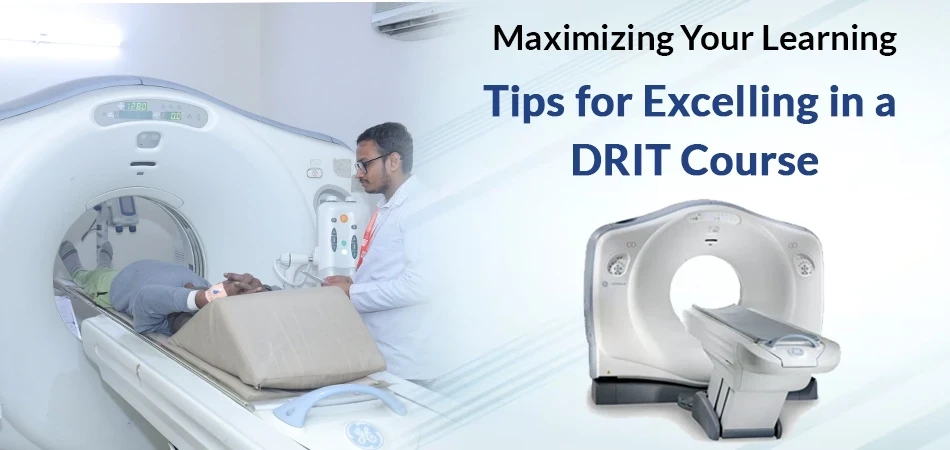Maximizing Your Learning: Tips for Excelling in a DRIT Course

Excelling in a DRIT (Digital Radiology and Imaging Technology) course requires a combination of effective study habits, practical skills, and engagement with the material. Here are some tips to help you succeed
1. Understand the Fundamentals
- Grasp Basic Concepts: Familiarize yourself with the foundational concepts of radiology and imaging technologies, including physics, anatomy, and radiographic techniques.
- Review Prerequisites: Provide you have a solid understanding of any prerequisite courses or subjects, as they often build the groundwork for advanced topics.
2. Stay Organized
- Create a Study Schedule: Schedule your study sessions around your course syllabus to ensure you cover all topics systematically.
- Keep Materials Handy: Organize your notes, textbooks, and digital resources for easy access and review.
3. Engage in Hands-On Practice
- Utilize Lab Sessions: Take advantage of any practical labs to gain hands-on experience with imaging equipment and techniques.
- Practice with Simulations: Use simulation software or virtual labs to practice your skills in a safe environment.
4. Collaborate with Peers
- Form Study Groups: Collaborate with classmates to discuss challenging topics, share notes, and quiz each other.
- Participate in Discussions: Engage in class discussions and online forums to deepen your understanding and clarify doubts.
5. Leverage Technology
- Utilize Online Resources: Explore online tutorials, videos, and articles related to digital imaging technologies to enhance your learning.
- Use Apps and Software: Familiarize yourself with relevant software and apps used in the field, such as imaging analysis tools.
6. Seek Help When Needed
- Ask Instructors: Don’t hesitate to reach out to your instructors for clarification on complex topics or guidance on assignments.
- Utilize Tutoring Services: If available, take advantage of tutoring services offered by your institution for additional support.
7. Stay Updated on Industry Trends
- Follow Relevant Journals and Blogs: Keep up with the latest developments in digital radiology and imaging technology by reading industry publications.
- Attend Workshops and Seminars: Participate in additional workshops or seminars to broaden your knowledge and network with professionals in the field.
8. Focus on Ethics and Patient Care
- Understand Ethical Guidelines: Familiarize yourself with the ethical considerations in radiology and imaging practices, including patient confidentiality and consent.
- Prioritize Patient Interaction: Practice effective communication skills to enhance your interactions with patients and ensure their comfort.
9. Prepare for Exams Thoroughly
- Review Regularly: Make time to review material consistently rather than cramming before exams.
- Practice with Past Papers: Use previous exams or sample questions to test your knowledge and get comfortable with the exam format.
10. Reflect on Your Learning
- Self-Assessment: Regularly assess your understanding of the material and identify areas where you need improvement.
- Set Goals: Establish short-term and long-term goals for your learning and career in digital radiology.
By implementing these strategies, you'll be well-equipped to excel in your DRIT course in Delhi and build a solid foundation for a successful career in the field!
Make your career in Radiology & Imaging with Ganesh Paramedical College
The DRIT course is essential for professionals nowadays as it equips them with the essential skills to utilize advanced digital imaging technology, addresses the growing demand for precise diagnostic services, enhances productivity in workflow, and offers promising career opportunities. As healthcare technology progresses, understanding digital radiologic imaging is increasingly important for high-quality patient care and staying competitive in the job market.
People May ask
What is a DRIT course?
DRIT stands for Diploma in Radio Imaging Technology. This course will help you to deliver a detailed understanding of the Radiological Lab techniques and provide many job opportunities to the student.
What are the Career opportunities after completing the DRIT course?
After finishing this course you can become a Radiological Lab assistant, research analyst, Radiological Nurse, PhD in radiology Medical officer etc
What is the average salary to be expected after finishing this course?
The average salary varies from 2.5- 6 lakhs depending upon the post and rank.
How to get an inquiry for this course?
You can contact us at PH No-011-47444444 Call Centre NO-011-47333333, Mobile No-9810183948.
Do paramedical courses require NEET?
No, NEET is not required for paramedical courses. However, a few colleges might have university entrance exams for students.
Is there any entrance exam for paramedical courses?
Admission to some of the paramedical courses is based on entrance exams. This includes JIPMER, NEET-UG, MHT CET, etc.
How many years is a Paramedical course?
Certificate courses go on for a duration of 1-2 years while degree courses are for 1-4 years.
Is paramedical a good career?
There are ample job opportunities for paramedical graduates and an increasing demand for trained people in these fields.

